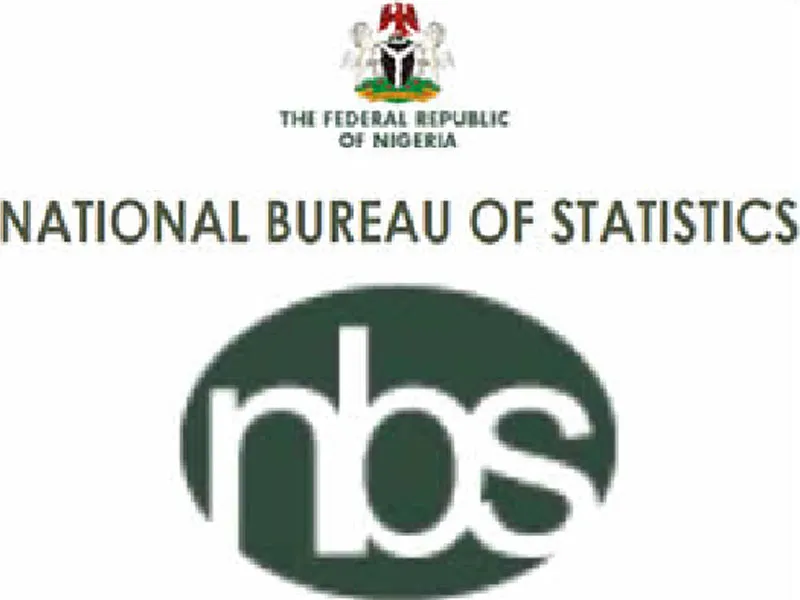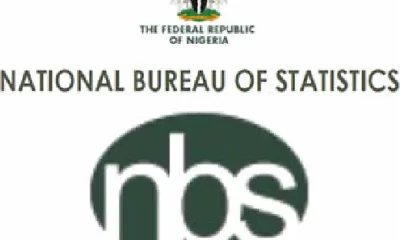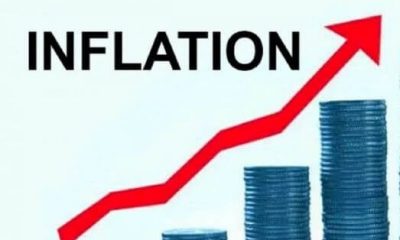Economy
Inflation, Food Security and Implications for Agric Revolution

By Okeoghene Akubuike
“My pension is only N90, 000 monthly; my children, two undergraduates, and one graduate all rely on this money and my wife’s little income from her petty trading.
“With the rising prices of food, we can barely afford to eat twice a day, not to mention meeting other needs.
This is the story of Mr David Omotayo, a pensioner whose children still rely on to meet their needs amidst other family demands in the face of increasing food prices and inflation.
The situation not different with Ms Blessing Ike, who said inflation has negatively affected her business and eroded her purchasing power.
“There is no profit from this business anymore, we are barely managing.
The high prices of foodstuffs coupled with the increasing price of cooking gas which I use for my business, leave me with no profit,” she told the News Agency of Nigeria.A civil servant, Mrs Amina Audu, said the high cost of living caused by inflation has reduced her living standard.
She says that 90 per cent of the family income is used on expenses ranging from food to other consumables such as cooking gas and electricity bills.
“It is impossible to save money in recent times”, Audu told NAN.
This is the reality in many Nigerian homes as inflation rate hits a 17- year high, the highest since September 2005 amid soaring food prices, according to the National Bureau of Statistics (NBS).
NBS statistics shows that Nigeria’s headline inflation rate increased to 21.09 per cent on a year-on-year basis in October 2022, indicating a 5.09 per cent increase compared to 15.99 per cent recorded in October 2021.
According to the Statistician-General of the Federation, Prince Semiu Adeniran, factors responsible for the increase in annual inflation rate include disruption in the supply of food products, increased import cost due to currency depreciation, among others.
Consequently, the average Nigerian cannot afford to purchase some of these staple food items, which the Multidimensional Poverty Index Survey (MPI) report launched on Nov. 17 confirms.
The MPI report revealed that 63 per cent of Nigerians are multi-dimensionally poor, accounting for 133 million Nigerians.
According to The World Bank’s Food Security report, domestic food price inflation remains high around the world. Information between June and September 2022 shows high inflation in almost all low-income and middle-income countries.
The bank, therefore, recommended Social Protection Responses to the Global Food Crisis, advising policymakers in developing countries to focus on the poor through social investment.
“Strengthening national social protection systems can help populations manage shocks and stressors and build long-term resilience to food insecurity.
“Social protection, food, and health systems can work together across sectors to improve food security and nutrition outcomes of vulnerable groups,” the report said.
Similarly, the International Monetary Fund (IMF) says high food insecurity is compounding the Covid-19 pandemic’s scarring effects on the vulnerable in Nigeria.
After its routine official visit to Nigeria in November 2022, the IMF said it anticipates that food prices would continue to increase in Nigeria in 2023 due to high fertiliser prices and recent flooding in many parts of the nation.
“Similarly, further volatility in the parallel market exchange rate and continued dependence on central bank financing of the budget deficit could exacerbate price pressures,” IMF said.
The Fund’s position is contained in its Staff Concluding Statement of the 2022 Article IV Mission in Nigeria.
The IMF recommended strengthening the performance of the agricultural sector as key to job creation, food security, and social cohesion.
However, the Federal Government has debunked insinuations that Nigeria will experience food shortage due to recent floods.
At the 5th Edition of President Muhammadu Buhari Administration Scorecard 2015-2017 series in Abuja, the Minister of Agriculture and Natural Resources, Dr Mohammad Abubakar, assured Nigerians that there would be no food shortage in the country.
Abubakar said in spite of the rising inflation in the country, which he said was a global crisis and the flood disaster notwithstanding, the country would not experience food shortage.
“Absolutely, we have enough to eat in this country. There is no shortage of food.
“Yes there is inflation and an increase in prices, but we have enough food to feed everyone. It is better to have inflation than to have no food. We have enough to eat and we will continue to have enough to eat,” Abubakar said.
Mohammed said one of the measures the government had put in place to ensure food security was dry season farming which would be done by also harnessing some of the flood waters.
However, Sam Amadi, an analyst and Director, Abuja School of Social and Political Thoughts, said: “if we are food secured then we want to see it in its affordability.
“Experts are predicting a difficult time with respect to food in Nigeria. Human security includes food affordability.
Economists have suggested concrete steps to address the rising inflation and food prices in Nigeria.
They also opine that the increasing inflation rate in Nigeria has impacted negatively on the living standard of Nigerians.
A lecturer at the Department of Economics, Kaduna State University, Prof. Aminu Usman, said the rising inflation rate meant devaluation of individual income, which amounted to drop purchasing power.
An economist, Dr Ayo Anthony, said Nigeria’s exchange rate management needed to be revisited; and the cost of production must be looked into before inflation can come down.
“The cost of production must be looked into because inflation in Nigeria is more of cost-push inflation. We have energy costs with diesel and petrol, which are on the high side now”, he said.
Another economist, Mr Tope Fasua, advised the federal government to put more efforts into the agriculture sector for increased food production.
“Nigeria is a largely agricultural country, yet 62 years after independence we can’t do better than grow rice. We are also not growing the crops properly and we are not even growing enough crops, diversify across the board, not even the ones we need.”
“So, one place to start is to do more in agriculture and bring some science into agriculture and recognise our luck, capability, and capacity to turn things around,” she said.
Okeoghene Akubuike is of the News Agency of Nigeria (NAN)
Economy
SEC Advocates Advanced Financial Inclusion by 2030

By Tony Obiechina, Abuja
The Securities and Exchange Commission (SEC) has stressed the need for Nigeria to harness its demographic dividend to advance financial inclusion through investments by 2030 for national survival or face deepening inequality.
The Director-General of the SEC, Dr Emomotimi Agama said this at the United Capital Asset Management Investment forum on Wednesday in Lagos.
Agama, in his keynote address titled: “Advancing Financial Inclusion through Investments: Bridging
Nigeria’s Knowledge and Wealth Gap,” said Nigeria must harness its demographic dividend to boost investment.
“Our theme, Advancing Financial Inclusion through Investments, is not aspirational; it is foundational to national survival.
“We stand at a pivotal moment. By 2030, Nigeria can either harness its demographic dividend or face deepening inequality. The knowledge-wealth gap is not merely an economic challenge; it is a moral imperative,” Agama said.
He said the term inclusion should be reframed as active financial involvement, where access meets empowerment, and capital becomes a tool for transformation.
Agama said that closing the financial inclusion gender gap could lift 700,000 Nigerians from poverty.
He said, “Nigeria has a great population yet we have a tiny drop of this number of persons involved in the capital market.
“That one reason for poverty, because we are running from money. We have to do something. Our market capitalisation is an opportunity to do something,
We all have
“We need to change the narrative and move the market forward. We must reach out to make the difference. We are committed to protecting investors and developing the market. Our goal is to do the right thing no matter whose ox is gored. We will work by the principles of fairness and equity to change the market. We will provide a fair ground for everyone to aspire.
He noted that MTN Nigeria’s share offering drew 150,000 new investors – 75 per cent women, 85 per cent under 40.
Agama recommended a four-pillar strategy for bridging the gaps.
He listed the four-pillar strategy as democratisation of financial knowledge, catalyse MSME Investment Channels, blended Finance Vehicles: Partner with Bank of Industry (BOI) to de-risk loans for women-led SMEs.
“We need to educate people about finances. As we drive this market, we do so for a purpose, I enjoin everyone to be the disciple and the apostles. Getting this market to move is a deliberate action,” he added.
| ReplyReply allForwardAdd reaction |
Economy
NPA Assures of Over N1.27trn Revenue in 2025

By Ubong Ukpong, Abuja
The Nigerian Ports Authority (NPA) on Monday assured that it would take into the coffers massive revenue of over N1.27 trillion in 2025, representing a 40 percent increase from the N894.86 billion it realized in 2024.
This ambitious target, the Authority said, was anchored on sweeping modernization efforts, the full activation of the Dangote Refinery’s marine operations, and the deployment of cutting-edge technology to enhance port efficiency.
Managing Director of the NPA, Abubakar Dantsoho, disclosed this in a presentation during his agency’s budget defence session wih the House of Representatives Committee on Ports and Harbours, where he defended the agency’s 2025 budget estimates and provided insights into its 2024 performance.
“Our 2025 budget proposal is more than figures, it reflects our aspirations for a more efficient, globally competitive port system,” Dantsoho told lawmakers, adding that over 70% of the proposed expenditure will go into capital projects.
For 2024, the Authority surpassed its revenue target of N865.39 billion, posting an actual realization of N894.86 billion.
However, Dantsoho revealed that only N417.86 billion, less than half of the approved N850.92 billion expenditure, had been spent as of the time of reporting.
Despite this, NPA made a record contribution of N400.8 billion to the Consolidated Revenue Fund (CRF) in 2024, nearly double the N213.23 billion remitted in 2023. Of this amount, a staggering N344.7 billion was deducted at source.
“This shows our unwavering commitment to national revenue generation, even when our own operational liquidity is affected,” the NPA boss stressed.
Dantsoho said the projected revenue increase is premised on several key assumptions and developments, including: The full operation of the Dangote Refinery, which alone is expected to draw in over 600 vessels annually through its Single Point Mooring (SPM) system; the commissioning of upgraded terminals at WACT and OMT, which will enhance container traffic; the implementation of automation tools such as the National Single Window, Port Community System (PCS), and Vessel Traffic Management System (VTMS); and increased cargo volumes stemming from global disruptions, including the Russia-Ukraine conflict, which has affected global trade routes.
He said the 2025 revenue is expected to come from the following key sources: Ship Dues, N544.06 billion; Cargo Dues, N413.06 billion; Concession Fees, N249.69 billion; and Administrative Revenue, N73.07 billion
Of the proposed N1.14 trillion total expenditure for 2025, N778.46 billion is earmarked for capital projects.
This investment, he said, will target the revitalization of critical infrastructure, including the Calabar, Warri, and Burutu ports and channels, and enhance towage services, channel depth, and compliance with international security conventions.
“Investments in infrastructure and technology are non-negotiable if we are to stay competitive regionally and globally,” Dantsoho emphasized.
He cited increasing competition from neighboring ports and aging assets across Nigeria’s coastal corridors.
The NPA also intends to address technology gaps by upgrading legacy systems and bolstering cybersecurity, ensuring Nigerian ports meet global standards for digital operations.
“We can say that with timely access to internally generated revenue and capital funds NPA would deliver the kind of impact Nigeria expects,” he said.
Chairman of the Committee, Hon. Nnolim Nnaji, urged the NPA to ramp up performance, improve port infrastructure, and play a greater role in addressing Nigeria’s revenue and unemployment challenges.
Nnaji said the ports remain a critical pillar of Nigeria’s economy, and urged the agency to meet rising expectations despite operational challenges.
“No country can thrive economically without high-performing ports. They are the economic heartbeat of every nation, determining how buoyant a country is through the flow of imports and exports,” Hon Nnaji said.
The committee praised NPA for its performance.
Nnaji stressed that the NPA’s performance has implications beyond maritime activity, noting that increased port output can significantly boost job creation across several sectors.
“The Nigerian Ports Authority is not just a revenue-generating agency, it is a national asset in terms of employment and economic impact.
“We expect to see detailed strategies on how to improve revenue generation and expand employment opportunities through your 2025 budget,” he said.
The lawmaker also pointed to growing interest in the development of new ports across the country but cautioned against neglecting existing port infrastructure.
“As we welcome investment in new ports, we must not abandon the old ones. Maintaining and upgrading our existing ports, both in the Eastern Corridor and the Western axis, is essential to long-term sustainability,” he added.
The Committee called for a clear outline from the NPA on how its 2025 financial plan will address pressing national concerns and reaffirm Nigeria’s competitiveness in regional and global maritime trade.
Economy
Senate Sets N10trn Revenue Target for NCS, Urges Agency to Curb Smuggling, Illicit Drugs

By Eze Okechukwu, Abuja
The Senate, through its Committee on Customs has set a revenue target of N10 trillion for the Nigeria Customs Service for the 2025 fiscal year, instead of the initial N6.584 trillion given to her earlier on while urging the agency to clamp down on smuggling and Illicit drugs.
The Chairman of the Committee, Senator Isah Jibrin (Kogi East), who gave the agency the marching order yesterday in Abuja during the budget defence of the revenue driving agency however commended her for exceeding its 2024 revenue target of N5.
079 trillion.The NCS team led by Deputy Comptroller General, Jibo Bello who represented the Comptroller General presented the 2024 budget performance with a revenue target of N5.
079 trillion, stressing that the proposal was exceeded by over a trillion naira.The Committee, obviously impressed by the performance commended NCS before asking them to go ahead and present the 2025 budget proposal, which the agency tied at N6.584 trillion revenue target with an expenditure of N1.132 trillion.
Following their presentation, members of the Senate Committee on Customs unanimously approved the recommendation of the revenue target of N6.584 trillion and the expenditure of N1.132 trillion for the 2025 financial year.
The Committee will subsequently present the budget proposal to the Senate at plenary most likely this week as the red chamber resumes today after a long recess tied to Eid celebration.
In his final remarks, Senator Jibrin emphasised the need for the NCS to rise up in terms of its surveillance with respect to illicit drugs and smuggling “to ensure that, as much as possible, you should be on top of your game”.
He said there are so many illicit drugs flowing all over the place, which according to him “is contributing to the issue of banditry in Nigeria because most of these guys are on drugs. What I’m saying is that, in addition to your revenue drives, you should also be mindful of some of these other functions.






























